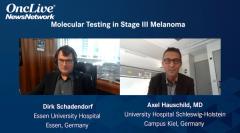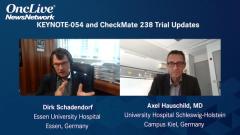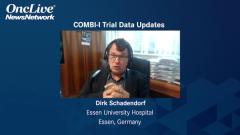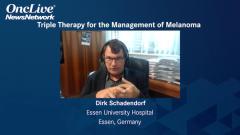
Triple Therapy for the Management of Melanoma
Episodes in this series

Transcript:
Dirk Schadendorf, MD:Do you think there is a role for triplet therapy?
Axel Hauschild, MD:Because you mentioned the TRILOGY trial twice—but we need to say, for those who are not experts, that the TRILOGY IMspire150 trial was using different drugs. It’s a different company. It was vemurafenib and cobimetinib, plus a PD ligand 1 and not a PD-1 [programmed death-1] antibody, namely atezolizumab. The trial design was a bit different, but this is not of real importance. The difference, by the way, was 5.8 months in PFS [progression-free survival]. It was 10.2 vs 16, so they were ending up with the triplets in the same ballpark with 16 months. Vemurafenib-cobimetinib was a little inferior to dabrafenib-trametinib, but it’s an indirect comparison. Coming back to your question, even if the trial would show positive results and demonstrate a larger difference, the question is still if this could replace PD-1 antibodies alone or ipilimumab and nivolumab. So if these is considered as new standards of care, I would have my doubts because you have only indirect comparisons, but still I would say there is a space for the triplets. These results were a bit disappointing because they were leading to enthusiasm prior to this release, based on the data presented only 3 months ago by Georgina Long at ASCO [American Society of Clinical Oncology Annual Meeting], which was a 42—almost a world’s record complete response rate in COMBI-i trial part 1 and 2. Now we are at part 3, and the complete response rate goes down to 17. How can you explain that, Dirk? Is it patient selection?
Dirk Schadendorf, MD:There are several interesting caveats from the COMBI-i study. What you see is for the 2-year landmark and overall survival for the triplet is in the same ballpark as nivolumab-ipilimumab, so there is not much of difference from the other triplet from the other company. But the doublet, dabrafenib-trametinib, is overperforming. We have a 2-year survival rate that is more than 7% higher than what was described for COMBI-d, for COMBI-v, and also for vemurafenib and cobimetinib. Usually targeted doublets had a 2-year survival in the range of 50%, 52%. Now you are above 60%, no explanation. That’s another interesting detail that needs explanation: the duration of response. We have learned over the last 5 years that duration of response using BRAF-MET combination is in the range of 13, 14 months. Duration of response in COMBI-i trial is now above 20 months for the doublet. There is no explanation why the duration of response is so high. The question indeed comes back: Is a specific patient selection we have had in phase 1/2 possibly driven by the fact that these biomarker studies required cutaneous lesions, and are therefore driving the patient selection to a certain subset of patients that is particularly favorable? Then these patients should get triplet therapy, because if we expect 40% complete responses, that would be really great. Or what happened in this stage in the phase 3 study—is there a particular patient selection that was driving extremely the positive results for dabrafenib-trametinib as doublet still under investigation?
Axel Hauschild, MD:Thank you very much for your expert opinion. I have a question. Were you thinking about a negative trial early in advance, or were you convinced that this trial flies out easily as a trial that showed significant PFS?
Dirk Schadendorf, MD:I was convinced after the phase 1/2 data that this study would meet its primary end point and hit PFS. I was having doubt that an overall survival end point would have been positive, but with the PFS end point, I was quite convinced that it would fly. I think everybody was surprised about that.
Axel Hauschild, MD:I just wanted to confirm myself that I was not completely wrong in my believing that this is a positive trial, but it isn’t.
Transcript Edited for Clarity














































